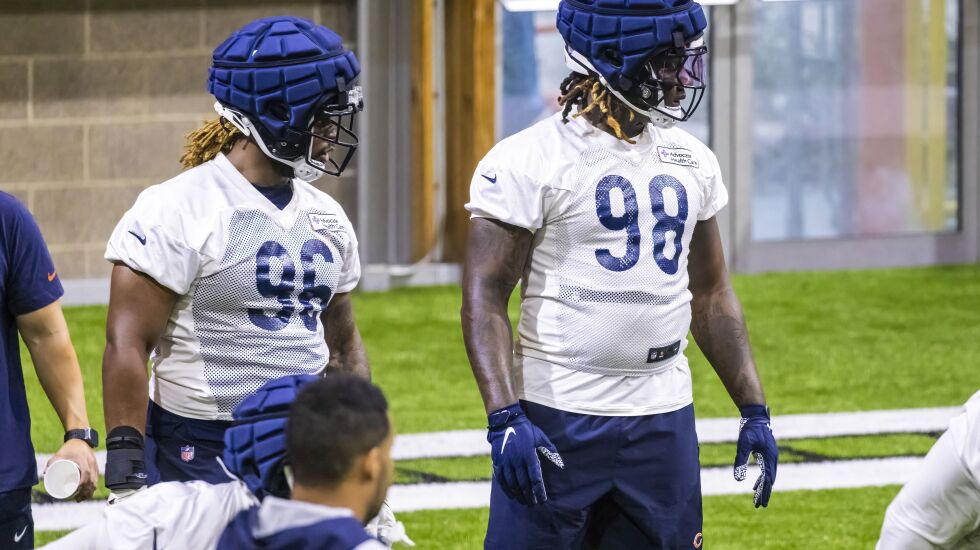
The Bears are still a work in progress across the board, and that’s especially true of one of their most vital units: the defensive line.
They don’t have homegrown pass rushers ready to burst into stardom, and their prized rookie defensive tackles likely won’t open the season as starters. Between free agency and the draft, things haven’t quite lined up for general manager Ryan Poles to completely overhaul the line, so he addressed what he could when he could.
Premier defensive ends are almost as valuable as quarterbacks, and Poles had no shot at drafting a game-changer without a first-round pick in 2022. And when he traded down from No. 1 to No. 9 in the draft this year, he did so to play the odds with multiple picks rather than go all in on one potential star like Alabama’s Will Anderson.
Anderson went No. 3 overall to the Texans and Texas Tech’s Tyree Wilson went seventh to the Raiders. Poles dropped back one more spot and took right tackle Darnell Wright. The draft fell nicely, though, for him to pick up defensive tackles Gervon Dexter (second round, No. 53 overall) and Zacch Pickens (third, No. 64).
So the big-picture plan on the line has Dexter and Pickens in the middle and players not yet on the roster on the ends. Ideally, Poles will fill in those names next year, when he has two first-round picks and a wealth of salary-cap space.
But for now, the Bears are going with veterans Justin Jones and Andrew Billings at tackle until the rookies are good enough to replace them. Poles signed 28-year-old end DeMarcus Walker to a three-year $21 million deal with a cheap out after two years and had little choice but to splurge $10.5 million on Yannick Ngakoue for one season once training camp was underway.
There’s potential in that scenario, but no certainty. And that’s where a head coach who specializes in defense like Matt Eberflus should have an effect. That part of the roster is far from perfect, but there’s enough talent that it’s reasonable to expect Eberflus and coordinator Alan Williams to develop it.
“You can do certain things with those guys in terms of alignments [and] match them up on certain guys,” Eberflus said after practice Tuesday. “There’s a lot of different ways that create [pressure], so we’re looking at that right now.”
It’s a pivotal factor in how far the Bears go during this season of transitioning from tearing down to building up. Every area of the roster that tilts toward a best-case outcome gives them a better chance of winning and even competing for a playoff spot.
Quarterback Justin Fields is at the top of that list, but defensive line is second. Every team needs quarterbacks and people who can flatten them.
Over the last five seasons, defenses that were top five in fewest points allowed finished, on average, fifth in opponent passer rating and 10th in pressuring quarterbacks. Every team that finished in the top 10 in pressure last season won at least seven games, and the four teams in the conference championship games were 13th or higher.
The Bears were second-to-last in creating pressure last season, doing so on just 15.9% of pass plays. They gave up more points than anyone in the NFL and allowed the seventh-highest opponent passer rating. They went somewhat against trend and forced the 14th-most turnovers.
It’s difficult to imagine the Bears leaping from the NFL’s worst defense to one of its best if they finish last in sacks again. They also allowed the second-most yards rushing in the league.
They need the Ngakoue and Walker signings to pay off and they need Dexter and Pickens to make the future materialize quickly. It’s not a perfect plan, but it’s feasible. And while Eberflus is a CEO-style head coach, his defensive expertise could determine whether it works.







